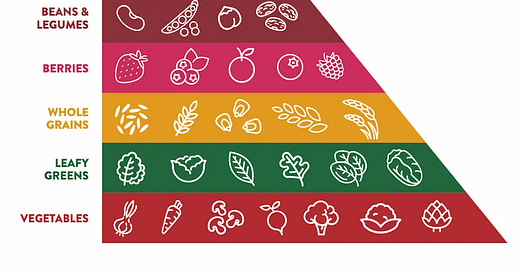
Hello everyone. If you’ve been reading BHK, you already know that my mission is to help you take care of your brain while still eating delicious food. After last week’s guest post about probiotics by of
, one of you messaged me to say: Emily is like the BHK of the gut health world! It’s true. Conversely, I am like the Second Brain of the brain health community. All of this is to say that even though we come to you from opposite ends of the gut-brain-axis, we are serving up the same science.So I thought you may like to read the guest post I wrote for this week.
Have you ever thought of your brain-healthy way of eating from the point of view of your gut microbiota? Well, I’ll let you all in on a little secret. When I was doing research for my book about the most science-based way to eat for a healthy brain, gut science shaped my food guidelines.
Not only did fiber gain a prominent spot in my 4F’s of Brain Healthy Food, what we know about cultivating a diverse and resilient community of gut microbiota is baked into my Brain Health Kitchen Food Pyramid.
Yes, my brain health food pyramid is actually a gut health eating plan, too. Let’s take a walk through the pyramid and I'll show you around.
The Brain Health Kitchen Food Pyramid
The BHK pyramid reflects the most studied brain-protective dietary patterns in one graphic. While you may often read that one diet is superior to another with regard to fending off age-related cognitive decline; that’s not true. There are several dietary patterns that have been proven to protect the brain. One of the most successful is the Mediterranean diet (MeDi), based on traditional foods eaten in the countries that surround the Mediterranean Sea. In fact, all the dietary patterns that have solid data to say they reduce dementia risk are based on the MeDi. The MIND diet (which stands for Mediterranean-DASH Intervention for Neurodegenerative Decline), is the most highly regarded MeDi spin-off. Following the MIND diet closely has been shown to reduce the risk of developing Alzheimer’s or another type of dementia by as much as 53%.
Yes, it is simply incredible that one could slash their risk of developing dementia in half just by changing up what they eat. What’s even more incredible is that many brain health experts, including myself, think this number could be higher. Read on to learn why I altered the MeDi and MIND dietary recommendations slightly based on the latest research.
Find a downloadable guide to the BHK pyramid and food guidelines at this end of this post! Plus, as a bonus I am sharing my individual Food Pyramids for Leafy Greens, Fish & Seafood, Meat, Poultry & Eggs, and Cooking Oils.



